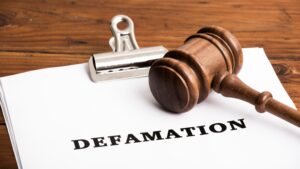How to Win (or Defend) A Defamation Case
January 31, 2023
Introduction to Defamation Law in California
California defines defamation as a false statement of fact, knowingly made by the defendant to a third party, that causes the plaintiff to suffer damages.[i] Slander and libel are two forms of defamation; slander is spoken, libel is written. Where the plaintiff is a private citizen, and the defamatory statements concern private matters, the plaintiff need only show negligence. Where the defamatory statements concern matters of public concern, the private plaintiff needs to show a higher level of culpability. And, where the plaintiff is a public figure, the plaintiff must show that the defendant acted with actual malice. Certain defamatory statements are, by definition, deemed to injure the plaintiff without further proof of injury. These statements include allegations challenging a plaintiff’s ability to practice a profession or a plaintiff’s moral character. Plaintiffs must specifically identify the claimed defamatory statements and show that the defendant failed to use reasonable care in determining whether the challenged statement was true or not.
What Kind of Damages are Available in a Defamation Action?
Where a plaintiff proves defamation that results from negligence, the plaintiff can seek damages to compensate for harm to the plaintiff’s business, expenses plaintiff incurred to address the defamation, and compensation for shame, mortification and/or hurt feelings. If the plaintiff proves, by clear and convincing evidence, that the defamatory statements amounted to “malice, oppression or fraud,” the plaintiff can seek punitive damages. It is important to remember that statements made as a part of a legal proceeding (i.e., in a pleading or while testifying in court) are not, as a matter of law, defamatory. This is referred to as the “litigation privilege.” California law also protects employees who report sexual harassment to their employer in certain circumstances.
Who Can be Held Liable for Defamation?
Defamation defendants typically include the speaker or a publication that published the claimed defamatory statements. Organizations that discuss or republish defamatory statements on the internet can be sued for defamation. Interestingly, plaintiffs may sue parties for their “responsible participation” in the publication of a defamatory statement, even if the party was not a speaker or publisher. Jones v. Calder, 138 Cal. App. 3d 128 (Ct. App. 1982), aff’d, 465 U.S. 783 (1984); Overstock.com, Inc. v. Gradient Analytics, Inc., 151 Cal. App. 4th 688 (2007) (hedge fund that reviewed and edited research firm’s published reports about public companies responsibly participated in the research firm’s publication of negative, but false, reports about Overstock, a public company).
What Defenses are Available?
There are lots of solid defenses to defamation claims. First and foremost, statements of opinion are not defamatory. Second, plaintiffs often try to claim that certain general statements defamed them. But, to prove defamation, the plaintiff must identify specific statements that were published at specific times, places, or in specific publications. Plaintiff must show that each statement was heard by persons who believed the defamatory statements and that plaintiff was harmed. Harm exists where the statements were automatically defamatory—like a false statement concerning plaintiff’s trade, business, or moral character—or where the plaintiff can show actual harm. An example of actual harm would be where the plaintiff lost a job following the defamatory statement and could not find another job in a similar field. If you find yourself as a defendant in a defamation action, it would be wise to consider whether you have insurance coverage. Homeowner’s policies can cover defamation claims, as do many corporate insurance policies.
Unsworth v. Musk, 2:18-cv-08048 (2019), is an example of an interesting, successful defense verdict. This case concerns the dramatic rescue of the Thai children who were trapped in an underwater cave. Mr. Unsworth was actively involved in the rescue efforts. Elon Musk, whose offer of an underwater craft Mr. Unsworth rebuffed, referred to Mr. Unsworth as “pedo boy” in a tweet read around the world. Mr. Unsworth, a private citizen, sued in Los Angeles federal court. The jury found unanimously for Mr. Musk, concluding that Musk’s statement was an insult (not a fact), that Mr. Unsworth had not been damaged since he received an award from the Thai king commemorating his rescue efforts, and most importantly, according to the jury foreman, Mr. Unsworth did not prove that the specific statements that he alleged to be defamatory were false statements of fact.
When Should I Contact an Attorney?
Defamation actions can be tough to litigate (and defend) in California. As briefly described above, the elements of a slander or libel case depend on the statements made, the subject of the statement, the speaker, and the forum. In addition, defamation actions have a one-year statute of limitations, so it’s important to act fast.
If you have been a victim of defamation, or if someone has accused you of defamation, Mann Legal Team can help. Mann Legal’s founder, Elizabeth Mann, obtained a multimillion-dollar jury verdict against corporate defendants whose executives participated in their parent company’s defaming of the plaintiff.
 |
Elizabeth Mann |
References
[i] California defamation law is succinctly stated in California’s Form Jury Instructions, which are found at CACI (California Civil Instructions) series 1700. Many states’ defamation laws are similar to California law.
© Copyright 2021. MANN LEGAL TEAM All rights reserved.